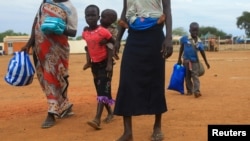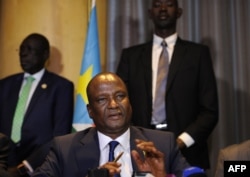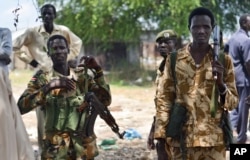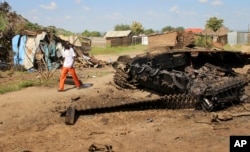South Sudan's First Vice President, Taban Deng Gai, is urging international donors not to abandon South Sudan "at this critical time" as fighting continues across parts of the country. The world's newest nation also faces a humanitarian crisis, as thousands of people have fled to neighboring countries.
"The humanitarian situation in South Sudan is appalling," Deng said Thursday in remarks to the United Nations General Assembly in New York.
"The major cost of this humanitarian catastrophe [since] 2013 is the displacement of people" due to fighting between government forces and the opposition, Deng added.
Fighting this year in the areas of Wau, Raja and Juba has aggravated the situation, the vice president said. He also blamed the region's problems on heavy rains that have caused floods and displacement in greater Upper Nile and greater Bahr al Ghazal regions.
At the same time, Deng insisted that the security situation overall is relatively calm in South Sudan. He told the representatives of U.N. member states assembled for their annual meeting that internally displaced persons are moving back to their homes in Juba and Bentiu. However, he admitted there are many remaining obstacles before the country can be considered at peace and secure.
'Criminals, not government' responsible
"There are numerous challenges that face humanitarian aid deliveries in South Sudan," Deng said. "Humanitarian work is one of the pillars of the government policy. Therefore, we are determined to cooperate with all humanitarian partners to address the challenges.
"Individual criminals have exploited the situation to kill, loot and harass innocent civilians and humanitarian workers. This must be regarded as purely criminal, and they do not represent the government," Deng said.
President Salva Kiir appointed Deng to replace former First Vice President Riek Machar, who fled the country shortly after deadly violence broke out in early July between South Sudan's army and forces loyal to Machar.
Deng told the General Assembly that Kiir administration officials have taken steps to increase humanitarian aid workers' access to those in need and ordered the removal of all illegal roadblocks. Many traders and other commuters have reported men in uniform demanding illegal bribes at illegal checkpoints along major roads in South Sudan.
Streamlined bureaucracy
The government's humanitarian office has agreed to establish a "one-stop shop" at UNMISS [United Nations Mission in South Sudan] to collect taxes, establish flight safety, provide access for aid workers and distribute visas, Deng added.
"This is to expedite the process of all documentations. This is going to work well," he said.
Deng said the government plans to repatriate all internally displaced persons during the next dry season, and that kind of activity requires money.
"The difference between failure and success is very narrow,” he said. “At the time, you think that everything is painting a dark picture of South Sudan. This is the time that we should be hopeful; that light is there at the end of the tunnel."
Ban: High hopes squandered
A high-level meeting also took place at the U.N. Thursday on the violence and humanitarian crisis in South Sudan. Opening the session, Secretary-General Ban Ki-moon gave a starkly different portrayal of the country's political landscape.
"For years, South Sudan struggled to gain its independence. Now it is struggling for survival. Rarely have such high hopes been squandered so quickly," Ban said.
He pointed out that 1 million South Sudanese children are not able to attend school, and nearly 5 million people face severe food shortages.
"I visited and I saw for myself the fear and despair of some of the 200,000 men, and women, boys and girls who are sheltering in U.N. protection sites," Ban said, "Hundreds of thousands of others are destitute, roaming the bush or sheltering with extended family, friends or strangers.
"Unbelievably, the situation has deteriorated since my visit in February. Violence has erupted again in many parts of the country, forcing people from their homes."
Ban said rape is occurring "on a massive scale" in South Sudan.
Humanitarian workers can only do their job if parties to the conflict respect their independence, the secretary-general said, but they face a severe funding shortfall of $700 million.








